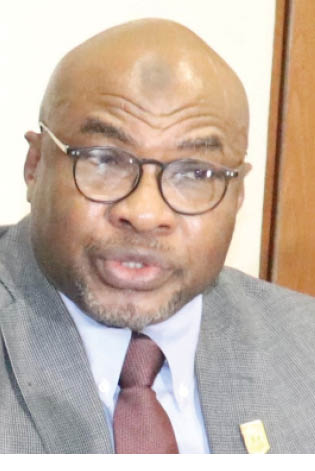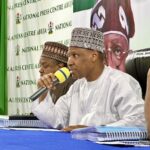Abayomi Oyelola Esq has 36 years’ experience in law practice and management. In this interview, he speaks about law practice in Nigeria, the rule of law, and the non-conventional security agencies.
How do you see the law practice environment in Nigeria today?
It is a long saying that lawyers are social engineers. And what is meant by that is society evolved based on law. And if you remember your philosophy and history, there was a time society was disorderly. Life then was short, brutish and nasty. It came to a point that with no rule and order, it became survival of the fittest. But when laws started evolving, then rules were made, laws were made and orders followed in order to strengthen society.
Is that why lawyers refer to themselves as ‘learned’, and ‘members of the noble profession’?
A lot of people have come to deride those sayings in the sense that it is self-adulating, in other words those of the legal profession are trying to praise themselves. Why it is called the ‘learned profession’ is that as a lawyer, you know a bit of everything like Medicine, Engineering, Quantity Surveying etc. and it is only a lawyer that can read into all aspects of human endeavor whether there is expertise over them or not. Noble in the sense that the carriage, the air around a legal person is that of reverence of somebody who is dressed in a lawyer’s robe; there is some sort of solemnity and integrity was the root of the nobility of the legal profession that they were held in high esteem. And because they are there to help in ensuring that justice, within the framework of the law, is done, and not only done but must be seen to be done. And as actors and participants in the temple of justice, it behoves them to ensure that justice is done. That confers on them the nobility of the profession.
What is your view about the state of the rule of law in Nigeria?
Can I compare Nigeria with a locomotive engine that has suffered some wear and tear? At some point, we profess to be among nations that observe rule of law, at another, the principle of rule of law is turned heads over. And inasmuch as we do not have justification for such inconsistency, one cannot hesitate to put his finger on the fact that throughout the history of modern-day Nigeria- that is from independence, we have been dominated by military regimes. Of course, others are quick to say but we have been in democracy for over 20 years now, why don’t we remove the military toga? And it is also the Englishman that said ‘old habits die hard’. So, there is this tendency for us to exhibit that military experience. So, you find that institutions and agencies of government that have been charged with the observance of some principles that are embedded in the rule of law run foul. Why? Because of that military mentality- the force. Whereas there is that saying that, ‘what you cannot achieve by dialogue you cannot achieve through the use of force.’ If we can only remember that, then as long as it takes for us to achieve our objective, we can only remain civil in our approach. So, rule of law in Nigeria has been tupsy turvy.
Again, if you look at the leadership of this country and you want to take some statistics, you find out that we have had military rulers in civilian garb that have dominated the landscape within the over 20 years of our democracy. You remember General Obasanjo and now Buhari. Only two civilians in the proper sense of it- Yar’Adua and Jonathan, and between them they have only ruled us for six years. And as civilians we have not actually helped because we are attuned to the dictates of our civilianized military heads.
How do you think the rule of law can be improved to attract international confidence in Nigeria?
When we talk of attracting foreign direct investment, we only mouth those statements. We don’t go deep to ensure that we really attract the investments. This is because all the parameters and indices that can allow the plantation of FDI in Nigeria are missing. That is not to say that legal framework for the entrenchment of FDI in Nigeria are absent. Where it for legal framework, Nigeria should be a haven for FDI. But beyond legal framework, there is the regulatory framework which is represented by institutions established to administer or enforce or to carryout the objectives of the legal framework. But the regulatory framework is faulty. Again, because of our lack of sincerity of purpose; we say one thing, we do another; we are not committed in carrying out what we say. We bring our personal idiosyncrasies and narrow backgrounds; our lack of nationalistic approach permeates everything. These factors will not allow FDI to berth in Nigeria. Look at Rwanda, the genocide that occurred in the 90s and our own civil war in the 60s we have not come out of it. Today, Rwanda in our very eyes is an investment destination.
Given the initial position of the Attorney General of the Federation, is it constitutional for component parts of Nigeria to have own security agencies?
What I have found out over the years is that we are always ad hoc in the governance of the country. We establish one thing and abandon it and establish another. For me Amotekun, Hisbah, Bakassi Boys, IPOB or whatever other militia that have been established in the past are not the solution to Nigeria’s security problems. They are compounding the problem for us. It is like trying to create a monster out of a weak monster which will eventually come to consume those who have created that new monster.
The question you ask, what went wrong with us really debating on the powers of the police and how effective are their operations? Let me give you a simple analogy: those who have been recruited in Amotekun can also be accommodated in the Nigeria Police and trained in a way that it will cut off the ‘ineffective’ toga we have of the police. In other words, weed away the old guard, and bring in new guard with serious-mindedness and empower them the way you want to empower a new police force. Give the cars, uniform and the money to the Nigerian Police and say we want a new police force. And post the new ones to areas they have knowledge about.
Let us look at the US model, you still have federal police, state police and county police, but when there are emergencies, the federal police can come in. This was contained in the Ekweremadu Report. This is what we should discuss and we should not be afraid of going deep and looking into this model of security.
There is no doubt that Nigeria is experiencing the peak of insecurity in the history of the country and if we don’t address it, we will all be consumed. I think there is complicity and complacency on the part of the country’s security apparatus.

 Join Daily Trust WhatsApp Community For Quick Access To News and Happenings Around You.
Join Daily Trust WhatsApp Community For Quick Access To News and Happenings Around You.


